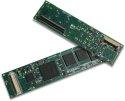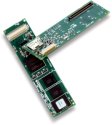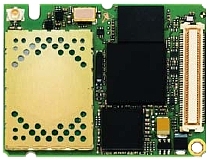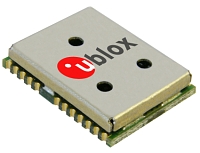DIY Linux cellphone components available
Jul 11, 2007 — by LinuxDevices Staff — from the LinuxDevices Archive — 6 views A vendor of tiny, Linux-based SBCs (single-board computers) will soon begin accepting pre-orders for cellular networking and GPS daughtercards. Gumstix said its “Goliath” daughtercards target remote data applications such as fleet tracking, as well as “hobbyists who want to build their own… phone.”
A vendor of tiny, Linux-based SBCs (single-board computers) will soon begin accepting pre-orders for cellular networking and GPS daughtercards. Gumstix said its “Goliath” daughtercards target remote data applications such as fleet tracking, as well as “hobbyists who want to build their own… phone.”
 Gumstix Verdex with Bluetooth, top and bottom (Click to enlarge) |
The Goliath daughercards will work with Gumstix's Verdex (pictured at right), a minuscule SBC about the size and shape of a stick of chewing gum. The Verdex is powered by an Intel PXA270 SoC (system-on-chip) — probably the most popular mobile phone processor in today's crop of Linux-based mobile phones.
Two Goliath models will be offered initially: the Goliath-vx, which implements GPRS/EDGE functions based on a Siemens MC75 wireless module; and the Goliath-GPS-vx, which adds a u-blox Neo-4S GPS module.


Siemens GPRS/EDGE and u-blox GPS modules
digg this story |
Additionally, Gumstix will offer a 4.3-inch LCD module based on a Samsung LCD. The LCD module will measure 4.2 x 2.6 inches (106 x 67 mm) — the same dimensions as the Goliath boards, according to the company.
Both Goliath modules will interface with the Verdex SBC via full-speed (12Mbps) USB, with GPRS signals redundantly routed to a serial interface. Additionally, both daughtercards will integrate a USB hub controller, enabling one off-board and all on-board Goliath USB devices to be simultaneously usable by the Verdex board.
As for audio routing, CTO Craig Hughes explained, “The audio routing has a digital PCM stream from the GSM module going to a port on the Gumstix motherboard, and uses AC97 to talk to the UCB1400 codec chip on the Goliath for generating analog audio (i.e., using mic/headset).”
Hughes expects most people to use the Goliath products initially in remote data applications, such as sensing, fleet tracking, and remote control (“think TCP/IP link to an autonomous vehicle,” he suggests). However, he said some customers might also use the board to build their own phones.
“I suspect [the Goliath boards] will be attractive to hobbyists who want more control/openness/flexibility than something like OpenMoko [story] might give. I bet most if not all the OpenMoko software could be made to work pretty easily on the Goliath.”
Asked about the telephony interface between the Verdex and Goliath boards, Hughes said, “The GSM module does all its own radio stuff. You send it AT commands to dial calls, connect GPRS, etc. For EDGE, you send some AT commands, then run pppd and you get a ppp0 device on the gumstix. There are open source libraries which know these 'standard' GSM AT command set extensions.”
He added, “The GPS shows up as a usb-serial port, against which you can just run gpsd.”
Asked what Linux software will be offered with the Goliath boards, Hughes answered, “We'll be providing software akin to what we provide today for other Gumstix products: hardware support in the kernel, plus 'userspace-friendliness' interface layers and config files. Basically, we provide all the glue to hook the hardware in to existing Linux applications like gpsd, pppd, ALSA audio, touchscreen input device layer, X windows, etc. All the userspace apps will be up to our customers to some degree, but likely the popular ones will quickly be discovered and folded into our 'standard' setup.”
“For example I expect it'll be pretty quick that folks take the more interesting parts of the OpenMoko software and port them to the gumstix/goliath combo,” he added.
In a statement, CEO W. Gordon Kruberg said, “These boards provide a tiny, yet powerful, communications platform that utilizes any combination of GPS, GSM voice, GPRS/EDGE, 802.11 (B/G), and Bluetooth.”
Availability
Gumstix plans to ship the Goliath-vx and Goliath-GPS-vx in volume in “late July.” It will begin accepting pre-orders through its online store on July 16, it said.
This article was originally published on LinuxDevices.com and has been donated to the open source community by QuinStreet Inc. Please visit LinuxToday.com for up-to-date news and articles about Linux and open source.